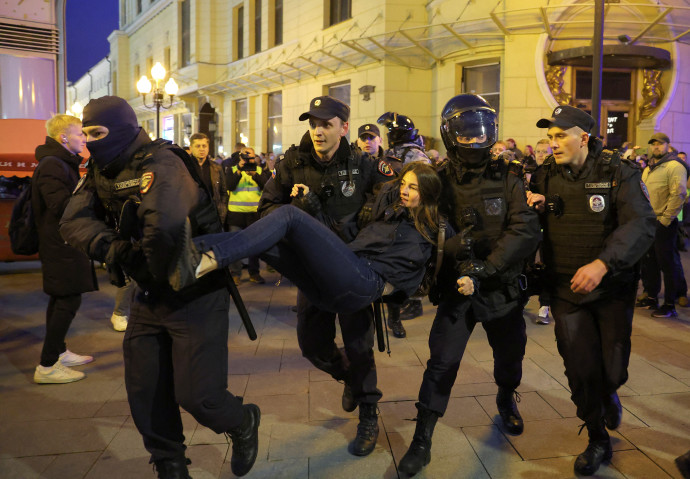In a bid to scramble 300,000 new recruits for the Ukraine war as part of Russian President Vladimir Putin's "partial" mobilization, the Russian Federation seems to be disproportionately targeting rural communities and ethnic minorities far from Moscow, as well as protesters demonstrating against the mobilization.
“It’s just hell here; they are grabbing everyone,” a resident of Sosnovo-Ozerskoye – a rural settlement of about 6,000 people in the eastern Siberian region of Buryatia near Russia’s border with Mongolia – wrote to Victoria Maldeva, an activist with the Free Buryatia Foundation who has collected hundreds of reports about mass mobilization, according to the Washington Post.
“Drunk men who are supposed to leave the very same day are roaming the town square,” the resident wrote. “Everyone knows each other here. This is impossible to bear. Women are crying, chasing the bus, and men pleaded for forgiveness before they left as they know they are facing certain death.”
The Free Buryatia Foundation and similar activists working in Yakutia, another remote, impoverished region of Russia in northeastern Siberia, said they were concerned that the mobilization is disproportionately targeting ethnic minorities that live in these areas, many thousands of miles from Moscow, according to the Post.
“When it comes to Buryatia, this is not a partial mobilization, this is 100% mobilization,” the head of the Free Buryatia Foundation, Alexandra Garmazhapova, said in a television interview. “And it amazes me how people who know how much Vladimir Putin likes to lie believed that this will be a partial mobilization.”
“When it comes to Buryatia, this is not a partial mobilization, this is 100% mobilization.”
Free Buryatia Foundation leader Alexandra Garmazhapova

In just one day, she said, she and her colleagues had received and identified more than 3,000 reports of povestka, or draft papers, being delivered in Buryatia within just 24 hours of Vladimir Putin announcing the draft, according to The Guardian.
“It doesn’t matter how many children you have, whether you have combat experience, or whether you served in the army or not. Conscription notices are being handed out to everyone,” one woman in Buryatia told the Financial Times.
Various rights workers from the Russian Far East said they believed that Russian military recruiters are focusing conscription efforts in rural and remote areas, rather than big cities like Moscow or St. Petersburg, due to the lack of media coverage of those areas and low protest activity, making it easier to carry out recruitment orders with less media-induced backlash.
The Asian ethnic populations of Siberia and the Russian Far East are also less likely to have personal and family connections to Ukraine.
The Financial Times spoke to several people who had been called up to the Russian army, fearing that they or their close relatives would face conscription.
In interviews, they painted a picture of a population fearful of being used as cannon fodder — and possibly facing a broader draft than Putin announced.
Yakutia residents resist conscription
In Neryungri, the second largest town in Sakha, also known as Yakutia, video footage appeared to show dozens of men being gathered at the Gornyak football stadium and loaded onto buses bound for recruitment centers, as family members bid tearful farewells. Many of the men appeared to be in their 30s and 40s.
“They’ve already given out draft notices to workers from Kolmar and Mechel,” two large mining companies with operations in the region, according to the activist who posted the video. “They were giving out draft notices all night.”
Dagestan once more dragged to war by Russia
In Dagestan, where Russia has also fought a "liberation" war in 1999, a video appeared to show people angrily confronting an official arguing in favor of the draft at a recruitment center.
She said that her son had been fighting in Ukraine since February.
“You’re fighting for your children’s future,” shouted the woman, who was not identified, in front of a crowd outside a municipal building.
“We don’t have a present – what kind of future are you talking about?” a man in the crowd responded.
Protesters "punished" with recruitment papers
In Moscow, as well as other large cities like St. Petersburg, thousands went to the streets in protest after Putin announced the mobilization. On downtown Arbat Street in Moscow, Police officers reportedly began giving draft notices to those they detained at the protest.
Among them was Artem Krieger, a young reporter for the Sota Vision news outlet, who was detained despite being there to cover the protests.
“All the men, absolutely everyone, was given a draft notice,” said Krieger during an interview with TV Rain from the back of a police van. That included men who had never served in the army, he said, who were now required to appear at their local recruitment centers.
Later, at the police station, Krieger and more than a dozen other men arrested with him were handed summonses ordering them to appear at their local military commissariats. On Friday, he was also sentenced to an eight-day jail sentence after a judge found him guilty of taking part in an unauthorized rally.
Non-ethnic Russian battalions’ presence in the Ukrainian theatre of war has been noted since the beginning of the war, with far east communities suffering disproportionate losses. Such formations include troops from Chechnya, South Ossetia, Tuva, Tatarstan, Bashkortostan (Bashkiria), Chuvashia, and other places.
